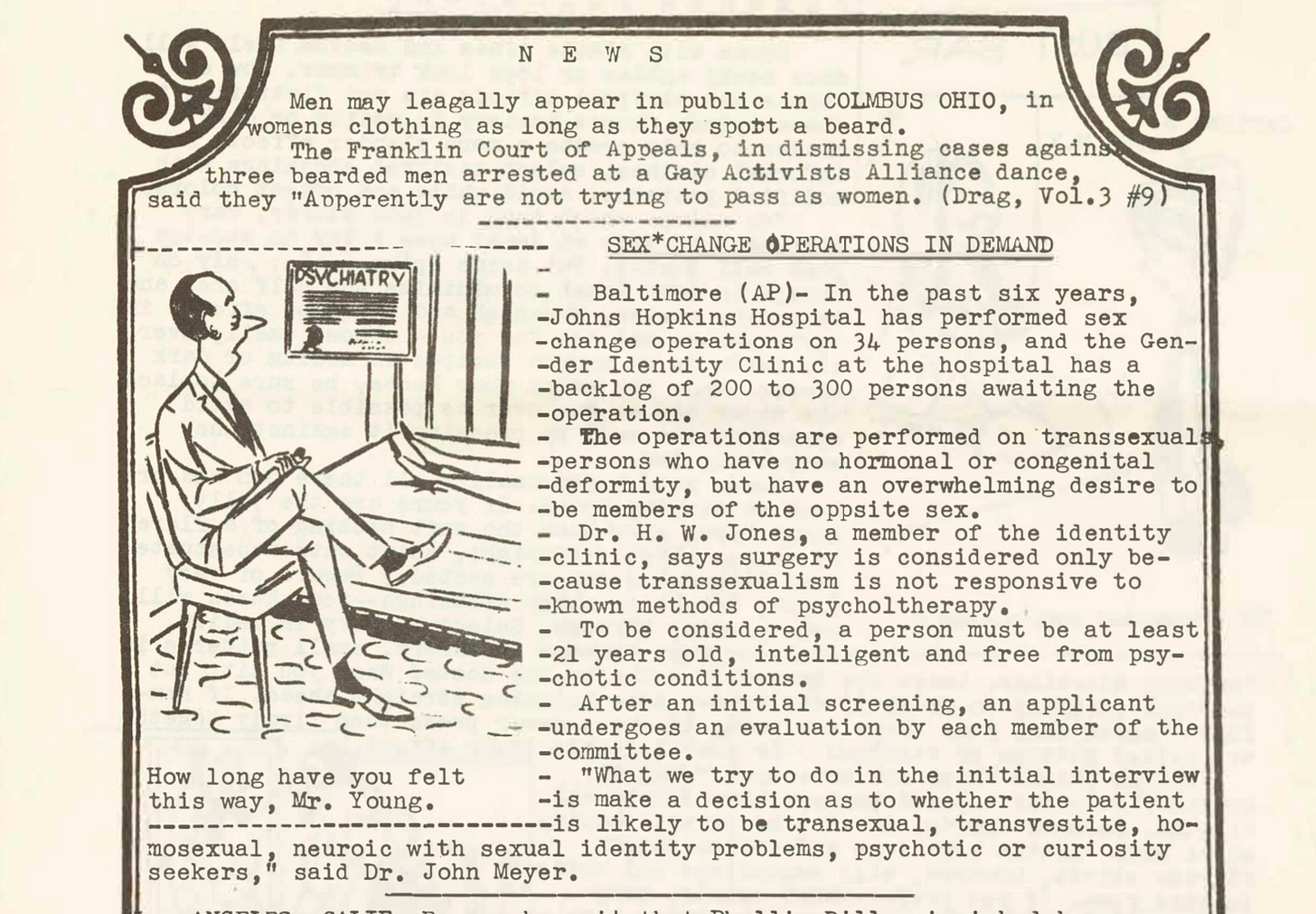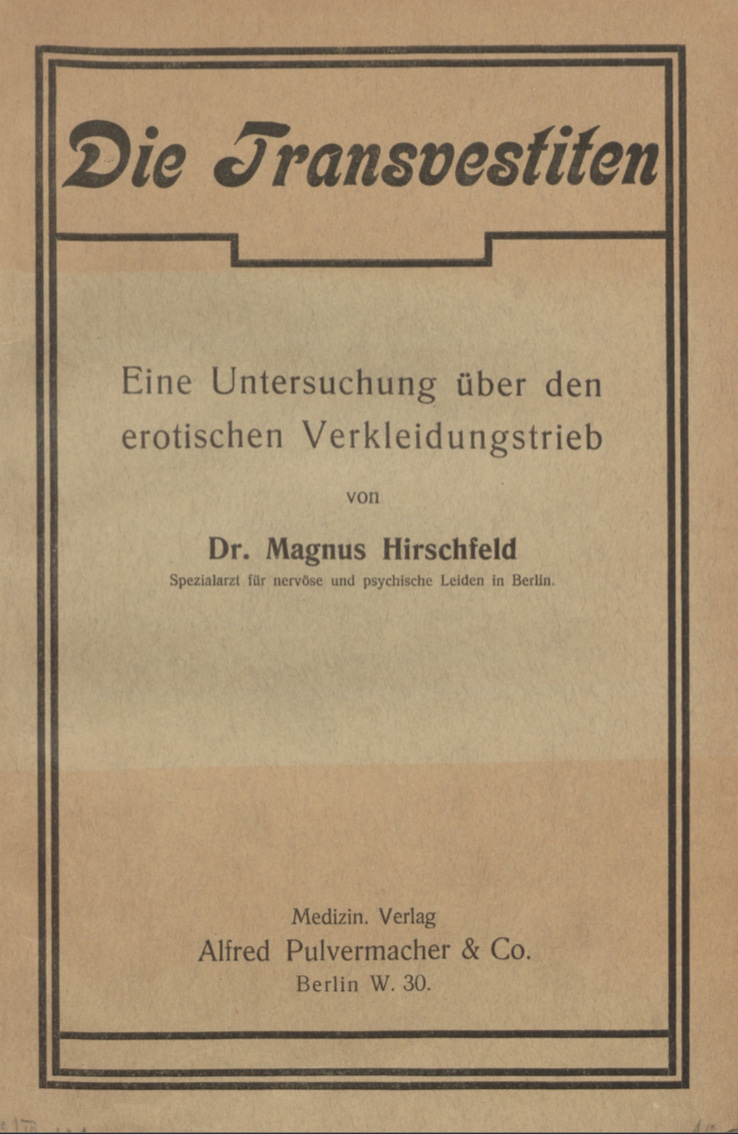First, listen to J. Jennifer Espinoza read a poem from There Should Be Flowers: “I Imagine All My Cis Friends Laughing at Tranny Jokes” (the second poem in this reading).
“The time has come for me to be alive
and for you to stop speaking. Please stop speaking.”

Second, think about why you are so in love with those big DDs: dysphoria and data, respectively.
What do we mean when we (trans women, I suppose) say our being (trans) is not a mental illness and isn’t a medical condition? It’s not so much a scientific counter statement as an indictment of the eugenic uses of “mental illness” as a form of social stigma and political justification for captivity and depravation. It’s a century-long assertion in the making, uttered by the first femmes who disagreed with how the sexologists Richard von Krafft-Ebing, or Magnus Hirschfeld, ignored their autobiographical testimonies in favor of pathologizing them, and uttered still now, when any assertion that trans people are real and have a historical foundation is met with the loud creak of goalposts being dragged across the field, ripping up the grass as they go:
“Can you explain the 4000% increase in trans identifying teens in the last 8 years or so?” beseeches me one.
“Show me the studies then, Karen” yells another after telling someone else to fuck off on Twitter.com
When we say the time has come for me to be alive and for you to stop speaking, perhaps we mean, simply: your fetish for certain forms of knowledge above others is your fetish, not mine. It’s hardly universal and it’s not innocent, so stop expecting me to bow before it. I can’t give you satisfaction in refutation because you don’t seek that, you are a bad faith artist.
And so, I have no interest in defanging, debunking, or taking down, point by point, the disingenuous rapture of the statistician. Or, as writes one professor of mathematics to me by email, unsolicited:
“In the public sphere, everybody seems to have an opinion, ranging from "trans is satanic" to "all introductions must include preferred pronouns", but very few people have any hard data to back up their opinions. (I certainly don't!!) People my age (60) just have anecdotal evidence, from friends whose children are trans, from children whose friends are trans, or just from reading the news. Which leaves us relying on our gut reactions, with predictably bad results.”
Do I need harder data than my flesh, dear professor? What are you so afraid of in the certainty of my gut that you would prefer to restrain me with abstract numbers? I don’t remember sending emails asking you to do more archival research on the history of the numbers you work with.
Transphobia and its spouse, cisnormativity, are flexible, mutable—yes, they are themselves gender fluid. This is not helpful to trans people who are ready to be alive. It simply means that no matter what knowledge we build in the intellectually dazzling and materialist forge of concrete experience, the analytics of hypervigilance, and the speculative imaginary of building life out of a nameless, punished concept—no matter what we reply, it will never satisfy the data fetishist and the goalpost mover, for such data aren’t neutral.
4000% is not an accurate or meaningful number for obvious reasons (it begins at its referent from a prior number that is impossible to vet due to social stigma and violence), but the point is not about which number is okay. The point is that if you believe that a population of human beings must be limited in their existence and reproduction, including social reproduction, then you are an advocate of eugenics, which is to say the selection of certain populations over others, where your care rests on the disposability of others.
Percentages have long justified eugenics.
Studies, likewise, do not appear out of a vacuum, for Karen or for anyone else. The methods used to study trans people are barbaric in their history and laughably unscientific in their methodology, except that science is very good at including the unempirical. The famed “desistence” narrative of trans youth being peddled ever more these days is based on one measly study in which young children—like, we’re talking 4 and 5 year olds—were labeled as “transgender” by clinicians because they liked toys and colors that did not rigidly correspond to their assigned gender at birth. Not, in other words, a great starting assumption for research. Then, when many of them grew up to be teenagers who did not transition, the satisfied researcher said “aha, a desistence rate of 88%,” which is an unscientific claim on its face since the presumption of the study overdetermined its implementation and interpretation. Worse, still, people elected to statewide office and nameless bot-like accounts on social media alike can use that study disingenuously to compare 5 year olds to 16 year olds.
A first year undergraduate student in the social sciences could tear apart these kinds of studies and their misuse, they’re just that poorly conducted.
But I don’t care if the science was done poorly as science. I care that it is dehumanizing to take a boy’s effeminacy, or a girl’s tomboyishness, treat it as a social emergency requiring “expert” study, and then call it trans to advance the delegitimize of whole swaths of young people, trans and non-trans alike. This is not a science I would ever practice, nor endorse.
Conversion therapy is an ugly, traumatizing business. It is hardly the opposite of gender affirming care. Most trans people I know don’t trust doctors or scientists. To be told we are slavishly brainwashed and altered by them is the height of fantasy.
And what of dysphoria, our deficient little concept of a friend? Why are two words powering an entire state apparatus of eugenic enforcement and cruel fantasies of social hygiene?
“Gender dysphoria” is codified in the Diagnostic and Statistical Manual, Volume V. It was a political compromise, as the DSM usually is. (A compelling reading of the history of DSM editions is quite simple, really: they track not mental illness by any stretch of the imagination, but instead the pathologization of socially stigmatized people and behaviors). In the prior editions of the DSM, transsexualism and gender identity disorder were pathologies, described as illnesses, though unfortunately for their architect, they were not obviously illnesses at all, mixing body and psyche in ways that far outpace our weak Western dualism. Until 1973, homosexuality was also in the DSM. When gay activists successfully won their political battle to have it removed and thus demedicalized, they were relieved to see transsexualism added to the next edition of the manual, so that all the pressure on their backs could be shifted to trans people. You see, for a long time both trans and gay and lesbian people were treated as homosexuals because their gendered behavior was considered deviant. Today people applaud homosexuality no longer being a mental illness but think being trans somehow still is.
Gender dysphoria in the DSM-V was written by a committee of people that included conversion therapists.
But the use of dysphoria to describe trans people is, more importantly, insubstantial. In the first place it reflects an incredibly recent shift in nomenclature. The OED can catch us up quickly: the term dysphoria didn’t emerge in English until the mid-nineteenth century. It’s first usage, in 1842, was to describe an emotional state of “dissatisfaction, restlessness, and suffering.” Anthropologists and sociologists developed this emotional description by studying “primitive societies” and “deviants,” with one 1933 study describing “a condition of dysphoria” as “when people feel shamed” for socially stigmatized behavior. In the mid twentieth century it continued to describe states of feelings like guilt, shame, and general emotional distress caused by one’s social environment.
This is why gender dysphoria is not actually a trans term. It merely specifies the arena in which dysphoria is concentrated: I experience emotional distress like fear, guilt, or shame, not because I am trans, but because my gender is treated as abnormal, illegible, dangerous, or undesired by the social world in which I live. This might manifest phenomenologically in my flesh, for instance, when I think my shoulders too broad, or my breasts too small, but it is because I fear how I will be treated when others assign and surveil my gendered body. I fear the penalties of my culture for my disobeyant form.
There is, in other words, no idiopathic medical issue, which is not surprising to us because cisgender is a fictional story our culture tells itself. Dysphoria describes a social situation of transphobia where transphobia—as in, animus towards and danger manifested towards trans people for their very existence—is the result of a social world where cisgender is granted immense power as the “normal,” default category of human experience.
And then, in 2018, a study comes out to coin a term, “Rapid Onset Gender Dysphoria.” The study is so heavily criticized by other scientists that the journal that published it has to issue a correction and even modify the title of the paper to make something very clear: the study relies entirely on “parent reports of adolescents and young adults perceived to show signs of a rapid onset gender dysphoria.” All of a sudden the study is actually, by its own admission in its title, not about transness at all. It is about how parents perceive their children’s coming outs as evidence of something that scares them that they call gender dysphoria, which, as we have already established, is not a medical condition inhering to transness, but a description of the emotional impact of transphobia on their children.
Suddenly, ROGD, by its own admission, is a study about transphobia, the widespread transphobia of parents.
Imagine the work it takes to turn to the child you are tasked with loving and caring for and saying to them “you aren’t wanted if you are trans, so you can’t even want to be trans, it has to be out of your control.” I find it sad.
The data fetishist is no doubt riled up at this point, eager to move the goalposts again. But I have left the field, there is no game left here. Every time you melodramatically invoke your concern, or interest in studies and numbers, I see your admission that you are in want of a justification for your aggression, for your eugenics, and for your authoritarianism.
A new bill tabled in North Carolina would legally force teaches to inform parents of any “gender non-conformity” in children. Congratulations on your gender binary fascism, please stop speaking now, I am ready to be alive.




With respect, I think you're throwing the baby out with the bathwater here as regards dysphoria/dysmorphia. I agree that a lot of unhappiness in trans children and adults is caused by their transphobic environment. But I believe it's also caused by body dysmorphia--which I also agree should not be medicalized DSM-style. But it's real nonetheless and not reducible to sociocultural factors. I've read numerous accounts of very young trans girls really hating having a penis (and some, but fewer, of trans boys wanting one). Much the same for adult transwomen. I have it myself because my face and body aren't remotely feminine. They're not bad-looking for a man even at my age (74) but completely wrong for the woman I feel myself to be.